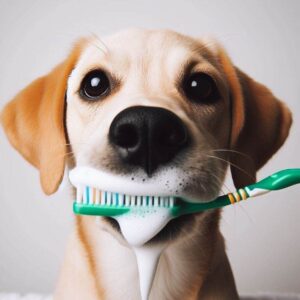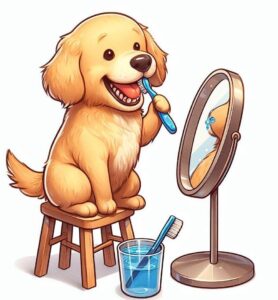We all know that a dog’s wagging tail and joyful presence can brighten even the gloomiest of days. But have you ever taken a moment to look at your furry friend’s pearly whites? Just like humans, dogs need proper dental care to maintain their overall health and well-being. Neglecting your dog’s dental hygiene can lead to various health issues, including gum disease, bad breath, and even heart problems. To keep those doggie smiles gleaming, we’re here to talk about accessories for keeping your dog’s teeth clean and strong.
Why Dental Health Matters for Dogs
Dental health isn’t just about keeping your dog’s breath smelling fresh; it’s a fundamental aspect of their overall well-being. Just like in humans, poor dental hygiene can lead to a host of health problems in dogs, affecting their quality of life and potentially shortening their lifespan.
Gum disease, or periodontal disease, is a common dental issue in dogs. It starts with the buildup of plaque and tartar on the teeth and can progress to gingivitis and periodontitis, which involve gum inflammation and tissue damage.
If left untreated, gum disease can lead to tooth loss, pain, and difficulty eating. The bacteria from infected gums can also enter the bloodstream, affecting other organs such as the heart, liver, and kidneys.
Bad breath is often an indicator of dental problems, including the buildup of bacteria in the mouth. Maintaining good dental health keeps your dog’s breath fresh and enjoyable to be around.
Healthy teeth are needed for your dog to chew their food properly. Tooth loss can lead to difficulties in eating and digesting food.
Dogs must have their teeth in good condition since they rely on their jaws to grasp and chew their food. Dental issues can result in poor nutrition and overall health problems.
Dental problems can lead to oral infections, and these infections can spread to other parts of your dog’s body. Bacteria from the mouth can enter the bloodstream, causing systemic health issues.
For instance, oral bacteria can affect the heart, leading to a condition called infective endocarditis. This is a serious condition that affects the heart’s valves and can be life-threatening.
Dental issues can be painful for dogs, just as they are for humans. Dogs may suffer in silence, and their discomfort can have a significant impact on their overall quality of life.
By maintaining good dental health, you ensure your dog lives a pain-free life, free from the discomfort of dental problems.
Accessories for Your Dog’s Dental Care
Just as you brush your teeth, your dog needs a toothbrush and toothpaste designed for them. These specialized dental tools are necessary for daily dental care.
Dog toothbrushes are available in various shapes and sizes, designed to reach different areas of your dog’s mouth. Some have bristles on both sides to make brushing more efficient.
Never use human toothpaste on your dog, as it contains ingredients that can be harmful to them. Dog toothpaste comes in a range of flavors that dogs find enticing, such as chicken or peanut butter.
Dental chews and treats are excellent accessories for maintaining your dog’s dental health. These products are formulated to help remove plaque and tartar as your dog chews on them.
Look for products that have received the Veterinary Oral Health Council (VOHC) seal of approval, as this indicates they meet specific standards for dental efficacy.
Dental toys are designed to provide entertainment while helping to clean your dog’s teeth. These toys often have textured surfaces or bristles that can help remove plaque and food particles.
As your dog plays with these toys, their teeth and gums are being massaged and cleaned, making them an excellent addition to your dog’s dental care routine.
Dental water additives are a convenient way to support your dog’s dental health. These additives can be added to your dog’s drinking water, helping to reduce plaque and fight bacteria.
They are particularly useful for dogs who may be resistant to other dental care methods.
Oral sprays are designed to control bacteria in your dog’s mouth and freshen their breath. These sprays often contain natural ingredients that can help maintain your dog’s oral hygiene.
Oral sprays are easy to use and can be a valuable addition to your dog’s dental care routine.
While home dental care is very important, regular professional dental cleanings by a veterinarian are equally important. Your vet can perform a comprehensive dental examination, remove stubborn tartar, and address any dental issues that may be present.
Professional cleanings ensure that your dog’s teeth and gums are thoroughly cleaned and that any potential problems are identified and addressed.
Tips for Maintaining Your Dog’s Dental Health
Introduce dental care to your dog when they are still a puppy. Starting early helps your dog become accustomed to the routine, making it easier to maintain their dental health throughout their life.
 If your dog is resistant to daily brushing, aim for at least a few times a week and consider using other dental care accessories to supplement their routine.
If your dog is resistant to daily brushing, aim for at least a few times a week and consider using other dental care accessories to supplement their routine.
Keep an eye on your dog’s toys, chews, and treats. Over time, these items can become choking hazards or may become too worn down to effectively clean your dog’s teeth.
Ensure that the dental chews and toys you provide are appropriately sized and designed to promote dental health.
Some kibble types are formulated to help clean teeth as your dog chews. Consult with your veterinarian to choose a diet that best suits your dog’s dental needs.
Schedule regular veterinary check-ups to monitor your dog’s dental health. Your veterinarian can assess your dog’s oral condition, identify any dental issues, and provide guidance on maintaining their oral hygiene.
Your vet may recommend professional dental cleanings when necessary. These cleanings involve scaling the teeth to remove stubborn tartar and addressing any underlying dental problems.
It’s important to consult your veterinarian for dental care advice. Avoid using human dental care products on your dog, and consult with a professional before trying home remedies.
When brushing your dog’s teeth, be gentle and patient. Use a dog-specific toothbrush and toothpaste, and approach the process with a calm and reassuring demeanor.
If your dog is resistant to brushing, consider using a finger brush or gauze to start with a gentler approach.
Puppies and senior dogs may require special attention to their dental care. Puppies are learning, and it’s important to make dental care a positive experience. Senior dogs are more prone to dental issues and may require more frequent check-ups.
Your dog’s dental health is not something to be taken lightly. With the right accessories and a commitment to regular dental care, you can ensure your furry friend enjoys strong, healthy teeth and a happy, pain-free life. Plus, that fresh doggy breath will make cuddle time even more enjoyable! So, go ahead and invest in these dental accessories to keep your canine companion’s smile bright and their health in tip-top shape.
